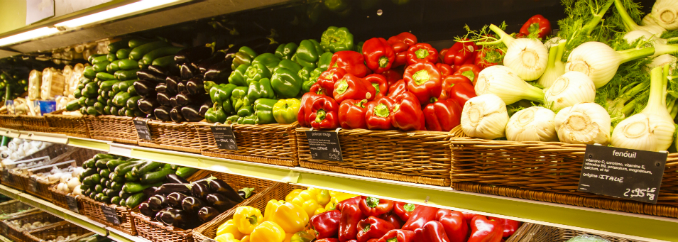Shops should be transformed to drive customers towards buying healthy food and drink, according to a report by University of Stirling academics.
The recommendation emerged in a Food Standards Scotland-commissioned study, co-authored by the University’s Leigh Sparks, Professor of Retail Studies, and Steve Burt, Professor of Retail Marketing.
The report set out to examine how the retail food sector can be transformed to encourage shoppers to consume healthier products. It follows a recent call from celebrity chef Jamie Oliver, for Scotland to take a lead in clamping down on sugary drinks and enhancing food education for children.
Choice
Professor Sparks said: “The environment confronting consumers is not a neutral one, allowing ‘free choice’. Promotions and product information, especially, shape consumers’ choices and behaviours. Retailing is both part of the problem, but could be a major part of the solution.

Professor Leigh Sparks co-authored the report.
“Voluntary initiatives and ‘simple’ healthy promotion have failed: the time to consider a range of actions to alter the architecture of in-store choice may now be upon us.”
The report highlighted the challenge faced by shoppers, who are ‘bombarded’ with presentations, prices and promotions that favour unhealthy products over healthy ones.
Professor Sparks added: “Consumers are attracted to, and purchase, these products above others, often on promotion, and often in bulk sizes far beyond immediate consumption needs.
“There is a need to understand and adjust the retail environment presented to customers in-store, as this drives choice decisions.”
The report recommended:
- Regulation of product pack displays, pricing and promotions – to make it simpler for consumers to make healthier choices
- Levies on salt, fat and sugar – similar to the ‘Soft Drinks Industry Levy’ – to encourage reformulation and resizing of food products
- Funding for trials to establish which interventions work best
- Introduction of a ‘Food Retail Standard’ – similar to the ‘Healthcare Retail Standard’ – to regulate product promotions
- Measures to be required by all food consumption and purchasing outlets – not just by food retailers
Professor Sparks said: “This is a controversial issue. The reactions to restrictions on tobacco and alcohol sales by retailers, the ‘sugar tax’ and minimum pricing for alcohol – as well as limiting junk food advertising to children – point to a fierce protection of the rights of people and businesses to sell and buy whatever they want, whenever, at whatever price.
“This is often enshrined as the rights of individual freedom – that people should be free to choose, even when the choices are damaging.”
Evidence
However, Professor Sparks insisted action is needed to tackle a growing health issue. He said: “The Scottish diet has become a short-hand for unhealthy living. All the evidence points to its stubborn lack of change, despite information, exhortation, campaigns and even small measures of legislation.
“Scots remain addicted to a diet high in sugar, salt and saturated fats, to the detriment of individuals and communities.”
Dr Gillian Purdon, FSS Senior Dietary Advisor, added: “Food Standards Scotland welcomes this report as it reinforces our view that urgent action needs to be taken to encourage and influence healthier food and drink purchases in Scotland.
“We recognise the good progress made by some retailers, however a level playing field is needed to allow both retailers and out of home businesses to redress the imbalance of promotions and provision of less healthy foods.”
Background information
Media enquiries to Lachlan Mackinnon, Communications Manager, on 01786 466 436 or communications@stir.ac.uk

